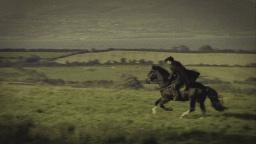Tv eye
Published in Early Modern History (1500–1700), Early Modern History Social Perspectives, Issue 1 (Jan/Feb 2010), Reviews, Volume 18Rapairí
Scun Scan Productions
Six-part series, Nov.–Dec. 2009, TG4
by John Gibney
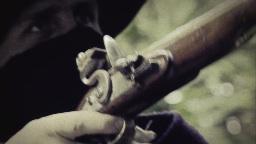
Re-enactment of a robbery by Redmond O’Hanlon. He was perhaps the most straightforward bandit.
Rapairí set itself the task of examining the lives of six ‘outlaws’ active in Ireland from the seventeenth century to the nineteenth. From a government persective the Irish seemed a rebellious people, and the focus on the lives of individuals who cared little for the law provides a useful prism through which to make sense of our somewhat vexing relationship to it. Eric Hobsbawn famously came up with the concept of the ‘social bandit’: individuals who acted in opposition to the law but whose decisions to do so were shaped and influenced by factors beyond their control, such as the application of the law in an unjust manner. This ensures that there are at least two contrasting perspectives on the law and its application: the perspective of those who formulated it, enforced it and might even benefit from it, and the perspective of those who acted outside it and denied its legitimacy. Being outside the parameters of the law could equally be construed as being inside the parameters of justice. And for certain individuals in seventeenth-century Ireland this could pose a particular question: in a recently conquered and colonised country, whose law should be recognised? The ‘tories’ of early modern Ireland, such as Dudley Costello and Redmond O’Hanlon (the subjects of the first and fourth programmes respectively), often sprang from the ranks of those Catholics who had been dispossessed in the aftermath of the wars and conquests of that era. Costello had been a Confederate officer in the 1640s whose lands were never returned to him after the Restoration in 1660. O’Hanlon was perhaps a more straightforward bandit (one who was by no means universally adored). But one man’s criminal is another man’s hero, and vice versa.
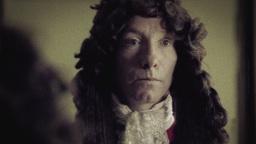
Dudley Costello (Diarmad de Faoite), who had been a Catholic Confederate officer in the 1640s, appealing (unsuccessfully) to have his lands restored.
Of course, one can make too much of this. It would be difficult to make the case that James Freney was Kilkenny’s answer to Robin Hood. A publican who became a thief, he acted in an unabashedly self-interested manner and readily informed on his compatriots as self-preservation dictated. The same can be said of the Louth highwayman Michael Collier, or the eighteenth-century horse-rustler Charles Dempsey, a.k.a. Cahir na gCapall. Such individuals could be glamourised in ways that were very far removed from the squalid reality of their criminal careers: all three left victims in their wake, and none should be confused with the merry men of Sherwood Forest.
A distinctive feature of the series was that each episode was intercut with contributions from contemporary individuals—like Willie Corduff of the Rossport Five—whose experience in the present arguably had a resonance with these shady figures from the past. Historians might grumble at the prospect of linking the past with the present in such an explicit manner. After all, such an effort would run the risk of simply harnessing history to the needs of a present-day agenda—a task that Irish historians have, in recent generations, deliberately claimed to eschew on the grounds that such links are ultimately dangerous. But what is wrong with drawing inferences from past events that may have a relevance to the present? As long as historical accuracy is not compromised, why should this be a problem?
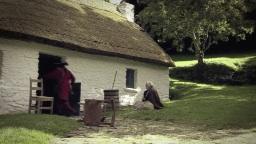
Re-enactment of a seventeenth-century eviction. Being outside the parameters of the law could equally be construed as being inside the parameters of justice.
In any case, the links that each programme drew with contemporary events were relatively subtle. There was no attempt to claim that, to give an example from the first programme, Willie Corduff is simply an updated version of Dudley Costello, even if Costello’s story had a natural relevance for Corduff. Indeed, the series did not shy away from the fact that the exploits of outlaws that were enshrined in folklore and popular culture did not automatically correspond to reality. Virtually nothing is known of the apocryphal eighteenth-century outlaw Eamon an Cnoic, the subject of episode two. Yet through song and story his supposed role as a champion of the weak and poor against the rich and powerful, often in surprisingly complex ways, has become enshrined as an enduring symbol, irrespective of the unknown reality.
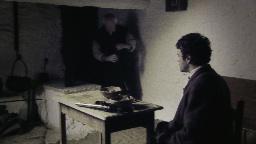
Ned of the Hill (Eoin Geoghan) being welcomed by Tomás Bawn Dwyer (Tadhg Ó Conchúir), his eventual assassin, and on horseback.
Irish people in the past have been willing to disregard and to challenge authorities they have deemed to be unjust and oppressive. But have we spent too long glamourising this aspect of our history? And has this made us far too tolerent of those who, in an independent state that got rid of its colonial master quite some time ago, might bend or break the law with impunity? The punitive attitude of the Irish state towards its weaker members means that sometimes the law should be challenged. But what of the activities of our financial and political élites and the condition in which they have left this country? Where does the law stand with regard to bankers? Perhaps our current condition is the logical outcome of a culture for which the law is, at best, an inconvenience to be avoided. And we cannot blame the British for that. Rapairí should be available to watch online, and will, at some point, almost certainly be repeated. It is well worth watching, and watching out for. HI
John Gibney was formerly an IRCHSS postdoctoral fellow at NUI Galway.
